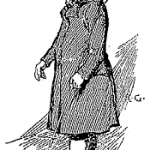Kennedy sprang up in his chair and glared angrily at his impassive companion.
“What the devil do you mean?” he cried. “What sort of a question is this? You may mean it as a joke, but you never made a worse one.”
“No, I don’t mean it as a joke,” said Burger, simply. “I am really rather interested in the details of the matter. I don’t know much about the world and women and social life and that sort of thing, and such an incident has the fascination of the unknown for me. I know you, and I knew her by sight—I had even spoken to her once or twice. I should very much like to hear from your own lips exactly what it was which occurred between you.”
“I won’t tell you a word.”
“That’s all right. It was only my whim to see if you would give up a secret as easily as you expected me to give up my secret of the new catacomb. You wouldn’t, and I didn’t expect you to. But why should you expect otherwise of me? There’s Saint John’s clock striking ten. It is quite time that I was going home.”
“No; wait a bit, Burger,” said Kennedy; “this is really a ridiculous caprice of yours to wish to know about an old love-affair which has burned out months ago. You know we look upon a man who kisses and tells as the greatest coward and villain possible.”
“Certainly,” said the German, gathering up his basket of curiosities, “when he tells anything about a girl which is previously unknown he must be so. But in this case, as you must be aware, it was a public matter which was the common talk of Rome, so that you are not really doing Miss Mary Saunderson any injury by discussing her case with me. But still, I respect your scruples; and so good night!”
“Wait a bit, Burger,” said Kennedy, laying his hand upon the other’s arm; “I am very keen upon this catacomb business, and I can’t let it drop quite so easily. Would you mind asking me something else in return—something not quite so eccentric this time?”
“No, no; you have refused, and there is an end of it,” said Burger, with his basket on his arm. “No doubt you are quite right not to answer, and no doubt I am quite right also—and so again, my dear Kennedy, good night!”
The Englishman watched Burger cross the room, and he had his hand on the handle of the door before his host sprang up with the air of a man who is making the best of that which cannot be helped.
“Hold on, old fellow,” said he; “I think you are behaving in a most ridiculous fashion; but still; if this is your condition, I suppose that I must submit to it. I hate saying anything about a girl, but, as you say, it is all over Rome, and I don’t suppose I can tell you anything which you do not know already. What was it you wanted to know?”
The German came back to the stove, and, laying down his basket, he sank into his chair once more.
“May I have another cigar?” said he. “Thank you very much! I never smoke when I work, but I enjoy a chat much more when I am under the influence of tobacco. Now, as regards this young lady, with whom you had this little adventure. What in the world has become of her?”
“She is at home with her own people.”
“Oh, really—in England?”
“Yes.”
“What part of England—London?”
“No, Twickenham.”
“You must excuse my curiosity, my dear Kennedy, and you must put it down to my ignorance of the world. No doubt it is quite a simple thing to persuade a young lady to go off with you for three weeks or so, and then to hand her over to her own family at—what did you call the place?”
“Twickenham.”
“Quite so—at Twickenham. But it is something so entirely outside my own experience that I cannot even imagine how you set about it. For example, if you had loved this girl your love could hardly disappear in three weeks, so I presume that you could not have loved her at all. But if you did not love her why should you make this great scandal which has damaged you and ruined her?”
Kennedy looked moodily into the red eye of the stove.
“That’s a logical way of looking at it, certainly,” said he. “Love is a big word, and it represents a good many different shades of feeling. I liked her, and—well, you say you’ve seen her—you know how charming she could look. But still I am willing to admit, looking back, that I could never have really loved her.”
“Then, my dear Kennedy, why did you do it?”
“The adventure of the thing had a great deal to do with it.”
“What! You are so fond of adventures!”
“Where would the variety of life be without them? It was for an adventure that I first began to pay my attentions to her. I’ve chased a good deal of game in my time, but there’s no chase like that of a pretty woman. There was the piquant difficulty of it also, for, as she was the companion of Lady Emily Rood, it was almost impossible to see her alone. On the top of all the other obstacles which attracted me, I learned from her own lips very early in the proceedings that she was engaged.”
“Mein Gott! To whom?”
“She mentioned no names.”
“I do not think that anyone knows that. So that made the adventure more alluring, did it?”
“Well, it did certainly give a spice to it. Don’t you think so?”
“I tell you that I am very ignorant about these things.”
“My dear fellow, you can remember that the apple you stole from your neighbour’s tree was always sweeter than that which fell from your own. And then I found that she cared for me.”
“What—at once?”



